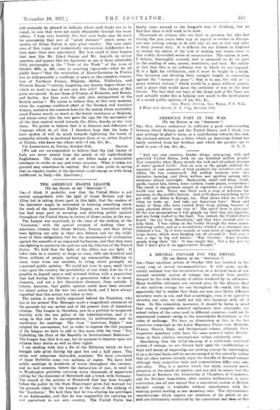THE AMERICAN RIGHTS LEAGUE.
[To vac Emma or 1116 " Sencrime."1 Sra,—1 think it probable, now that the United States is not merely eympathetio with the fight of Great Britain and her Allies but Is taking direct pert in this fight, that the readers of the Spectator might be interested in knowing something about the work of the Amerioan Rights League, an Association which has had some part in arousing and directing public opinion throughout the United States in favour of direct action in the war. The League was organized, at the time of the sinking of the Lusitania,' with the special purpose of making clear to American citisene that Great Britain, France, and their Allies were fighting not only in their own defence and for the fulfil- ment of their obligations, but for the maintenance of civilization against the assaults of an organized barbarism, and that they were also fighting to maintain the policies and the liberties of the United States. We held that the fight of the Allies was our fight. It takes time in a country as large as ours, with one hundred and three millions of people, making up communities differing in ninny ways from one another, to bring about promptly an organised public opinion. We could not even be sure, until there came upon the country the probability of war itself, how far it is possible to depend upon a real tuitional feeling with a population that had during the lifetime of a generation taken in so many elements, and not a few discordant elements, from outside. I believe, however, that public opinion could have been aroused for direct action in the war two years back, and I have always regretted that this action was taken so late.
The nation is now fairly organized behind the President, who has is his several War Messages made a magnificent statement of the grounds for our action and of the present duty of American citizens. The League is, therefore, now in a position to co-operate heartily with the war policy of the Administration, and it is using to this end its correspondence, its publications, and its machinery for meetings. The term " American Rights " was adopted for convenience, but in order to expreae the full purpose of the League we have to add to this main title the term " For Upholding the Duty of the Republic in International Relations." The League has, that is to say, for its purpose to impress upon our citizen their duties as well as their rights.
I am sending with this a file of the Bulletins whioh we have brought into print during the past two and a half years. The series now comprises thirty-five numbers. We have circulated of these Bulletins some two millions of copies. We have held public meeting. in hundreds of towns throughout the comntry, and we had occasion, before the declaration of war, to send in to Washington petitions carrying many thousands of signatures rolling for the di.nissal of Bernstorff and a break with Germany. The record of the actions of Berustorff that has been brought before the public by the State Department gives full warrant for the grounds taken by the League at the time of the sinking of the ' Lusitasia.' We held then that he was abusing his privileges so an Ambassador, .and that he was responsible for carrying on war operationl, in our own country. The United States ham
finally oome around to the League's way of thinking, but we find that there is still work to be done.
Thousands of citizens who are loyal iu purpose, but who had during the past years been lazy in regard to events in Europe. are now writing asking to be told why we aro at war and what is their present duty. It is difficult for our friends in England to realise the extent of the task of tusking war issues clear to this widely diversified series of communities. The nation is uow. I believe, thoroughly aroused, and is prepared to do its part in the sending of men, money, munitions, sad food. We realise at last that this is no ordinary war in whioh we are engaged. It is a fight for civilization, and it must be fought to a finish. Our lecturers are devoting their energies largely to contending against the "menace of peace "; that is to say, the risk of " peace without victory," which would be a peace without justice, and a peace that would mean the certainty of war in the near future. The fact that our boys of the Army and of the Navy aro now actually under fire is helping very much to the development of a sound public opinion.—I am. Sir, do.,


































 Previous page
Previous page